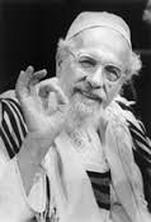|
Renée and I head to Portland, Oregon this Thursday for a Scholar in Residence Shabbaton at P'nai Or. Then we'll be in Eugene on Wednesday night at Temple Beth Israel for a concert. Our trip ends at Ashland's Havurah Shir Hadash for a Thursday night concert and Sunday Master Storytelling Workshop, all part of the Reb Zalman Legacy Shabbaton. Whew! This post is from a talk that was given in memory of Reb Shlomo Carlebach, tz"l that R' Zalman tz"l presented at the 92nd Street Y in New York City. I have not edited it in order to preserve the R' Zalman's unique way of telling. His voice shines through, yes?  Once there was a woman who was very poor. Her husband died and she didn't have any children. Oy! She wanted to say kaddish. It was before egalitarianism, so she couldn't go to say Kaddish in shul. She took in an extra load of laundry, and would do that work and take that money to the shammes, and ask the shammes to say a kaddish, and somehow she felt that this was right. After a while she felt that there must be so many people who no one says kaddish for, so she worked still harder and got together another couple of coins and said to the shammes, "Will you say another kaddish for someone who has no one to say kaddish for him?" He agreed. One day she had to pay the rent, and she didn't have money, and she was really in tsores. She's walking down the road a little bit, and she's saying, "Dear G!d, I could use some help," when a carriage comes by and a man, well dressed, noble looking, invites her to sit in the carriage, and says, "Why are you so troubles? What's going on?" She tells him of her tsores, trouble, her travail, and he takes out a wechsel - a check, a note to the banker, saying, "Pay this woman ten thousand rubles." She didn't need that much, but she took the note and went to the bank and presented it to the teller. The teller says, "It's a big note, something I can't handle. I have to go to a higher up." He sees the note, and he too says, "No, the president of the bank has to handle that: we cant' handle it." They usher this woman to the president of the bank, and he says, "Where did you get tis note?" She looks around the room, and there were pictures, portraits of people and she points to one portrait and says, "This man - this is the man that gave me the note." The banker nearly faints. It's been eight years since his father, whose picture was there, has died, and he hasn't said kaddish for his father. This woman, who had hired, with her hard work, someone to say kaddish for someone who needed the kaddish, helped that banker, and so she got helped in return. *******
R' Zalman preceded his telling of the story with this: Reb Shlomo - what a storyteller! The way a thing came alive before our heart's eyes! He took us into virtuous reality, moving us into a place in which we felt that the ideal, the virtue, was more real than what we see with out eyes. He was a creative artist of story telling. He read the same stories as I did, but he told them as if he had seen it all happen, and yes, in his imagination he did wee it happen in a most vital and exciting way. Telling stories is a spiritual art form. The Ba'al Shem Tov said that Judaism is not a burden, it's a way to pamper your soul. Singing niggunim and telling stories were ways in which people did that. A rough table, a glazele with schnapps, people singing a melody. Outside it's cold and the wind is blowing, but a big pot belied stove is making it warm, and they're hanging out there: and they shmooze. "I want to tell you a story from my Rebbe!" - they would do a "Can you top this?" Have you ever seen a Tzaddik like he was? ******* From Kol Chevre, 14th Yahrtzeit Issue, Pg 68-69. Does anyone know if this is still published or if copies of any of the published issues are available for purchase? ******* Please consider offering a tax deductible donation to support this project and the work of DC's Jewish Renewal community Minyan Oneg Shabbat. Thank you.
0 Comments
Your comment will be posted after it is approved.
Leave a Reply. |
Mark Novak is a "free-range" rabbi who lives in Washington DC and works, well, just about everywhere. In 2012 he founded Minyan Oneg Shabbat, home to MOSH (Minyan Oneg Shabbat), MindfulMOSH (Jewish mindfulness gathering), and Archives
June 2017
Categories
All
|
 RSS Feed
RSS Feed
